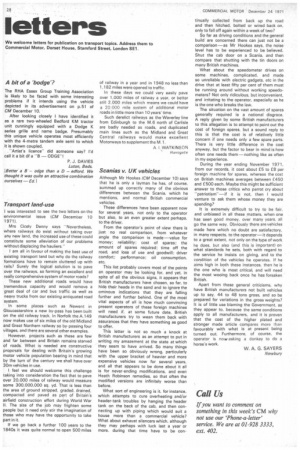Scanias v. UK vehicles
Page 30

If you've noticed an error in this article please click here to report it so we can fix it.
Although Mr Hookes (CM December 10) says that he is only a layman he has, of course, summed up correctly many of the obvious differences between the Scania. which he mentions, and normal British commercial vehicles.
These differences have been apparent now for several years, not only to the operator but also, to an even greater extent perhaps. to the driver.
From the operator's point of view there is just no real comparison, from whatever angle the comparison is made—value for money; reliability: cost of spares; the amount of spares required; time off the road, and loss of use and goodwill: driver comfort; performance; oil consumption. etc.
This list probably covers most of the points an operator may be looking for, and yet, in spite of all the obvious signs, it appears that British manufacturers have chosen, so far, to hide their heads in the sand and to ignore the ominous indications that they are falling further and further behind. One of the most vital aspects of all is how much convincing present operators of these foreign machines will need if, at some future date, British manufacturers try to wean them back with assurances that they have something as good to offer.
This letter is not so much a knock at British manufacturers as an attempt to put in writing my amazement at the state at which they seem to have arrived. So many things have been so obviously wrong, particularly with the upper bracket of heavier and more expensive vehicles now for several years, and all that appears to be done about it all is for never-ending modifications, and even Heath Robinson remedies, so that often the modified versions are infinitely worse than before.
What sort of engineering is it, for instance, which attempts to cure overheating and/or header-tank troubles by hanging the header tank on the back of the cab, and then connecting up with piping which would suit a house more than a commercial vehicle? What about exhaust silencers which. although they may perhaps with luck last a year or more, during that time have to be con
tinually collected from back up the road and then hitched, bolted or wired back on, only to fall off again within a week of two?
So far as driving conditions and the general build are concerned there can just not be a comparison—'as Mr Hookes says. the noise level has to be experienced to be believed. Shut the cab door on a Scania, and then compare that shutting with the tin doors on many British machines.
What about the speedometer drives on some machines. complicated, and made so unreliable with electric gadgets. etc in the drive that at least fifty per cent of them must be running around without work.ing speedometers? Not only ridiculous, but inconvenient, and irritating to the operator, especially as he is the one who breaks the law.
The situation on the vast amount of spares generally required is a national disgrace. A reply given by some British manufacturers to this allegation is to attempt to point out the cost of foreign spares, but a sound reply to this is that the cost is of relatively little concern if one needs only a few spare parts. There is very little difference in the cost anyway, but the factor to bear in mind is how often one needs them—nothing like as often in my experience.
During the year ending November 1971, from our records, it cost about £5 to £8 per foreign machine for spares, whereas the cast on British machines averages between £450 and £500 each. Maybe this might be sufficient answer to those critics who parrot cry about "patriotism" —if it is not, then I would venture to ask them whose money they are spending?
It is extremely difficult to try to be fair, and unbiased in all these matters, when one has seen good money, over many years. all go the same way. Obviously there are vehicles made here which no doubt are satisfactory, in many respects, to the operator—it depends to a great extent, not only on the type of work lie does, but also (and this is important) on what standards he sets, both with regard to the service he insists on giving, and to the condition of the vehicles he operates. If he aims high in both these instances, then he is the one who is most critical; and will need the most wooing back once he has forsaken British.
Apart from these general criticisms, why have British manufacturers not built vehicles up to say, 44 to 48 tons gross, and so be prepared for variations in the gross weights? It is of little use blaming the Government. as they appear to, because the same conditions apply to all manufacturers, and it is proven that the cost of the higher plated and stronger made article compares more than favourably with what is at present being turned, out. Furthermore, of course, the operator is now asking a donkey to do a horse's work.
W. A. G. SAYERS Newbury




































































